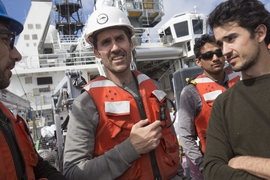Every corner of the globe has suffered from supply chain disruptions during the coronavirus pandemic. Beginning in January with a focus on China manufacturing, the MIT Humanitarian Supply Chain Lab (HSCL) began providing evidenced-based analysis to the U.S. Federal Emergency Management Agency (FEMA) to inform strategic planning around the supply chain risks. By March, the focus turned to domestic food supply chains and freight markets in the United States so that FEMA could anticipate potential response scenarios. Through this engagement, HSCL developed a rapid vetting and publishing approach that aligned with the pace and volatility of the situation.
HSCL is part of the Supply Chain Analysis Network (SCAN) — along with Dewberry, the Center for Naval Analyses, and American Logistics Aid Network — that supports FEMA Logistics Management Directorate during crisis activations. HSCL hosts three of the five team members that delivered 20 grocery sector and freight assessments over 10 weeks. Each assessment followed a week-long research and industry peer review process before delivery to FEMA.
As an example, the Friday freight assessment begins on Monday as HSCL researchers develop hypotheses based on the data from several proprietary channels, publicly available media, and primary interviews with practitioners from the field. On Tuesday, the hypotheses are formalized into a written digest and subsequently shared on Wednesday with a group of private sector leaders. These professional volunteers, who are involved in food supply chains and freight movement, review and respond to the hypotheses. On Thursday, the HSCL team compiles further relevant data and industry feedback into a draft assessment. This assessment is circulated for final industry review on Friday, before sharing with FEMA.
"Our process is as rigorous as possible given our near real-time engagement," remarks Jarrod Goentzel, director of the HSCL. “Our aim is to synthesize evidence and organize ongoing peer review with our industry partners to provide strategic orientation for government decision-making.” Senior leaders use the ecosystem assessments to anticipate shortages and prepare emergency support. “We’re talking to retailers, shippers, and carriers to find out how the market is responding,” according to lab researcher Chelsey Graham. “We look at data such as loads tendered or rejected, wait times, freight volume, and ocean sailings that are triangulated with other economic data to develop evidence and ensure it aligns with the truth on the ground from factory floors to store shelves.”
The complexity of ecosystem assessments may increase with the onset of the Atlantic summer hurricane season. Further natural disaster impacts would uniquely stress supply chains already fatigued and constrained by a relentless pandemic. The HSCL has a long history of working with government and industry during hurricane season, starting with volunteer efforts in 2017 and activations with SCAN in recent years.
HSCL has also led efforts to reflect and improve public-private sector coordination during crises. In December 2017, MIT hosted a roundtable on “Supply Chain Resilience: Restoring Business Operations Following Hurricanes,” producing the earliest report on a very active hurricane season. In 2018, Goentzel and MIT Center for Transportation and Logistics (CTL) Director Yossi Sheffi were both invited by FEMA to deliver PrepTalks, broadcasts given by subject-matter experts to promote innovation in emergency management. The lab was contracted by the National Academies of Science, Engineering, and Medicine to support a recently released study “Strengthening Post-Hurricane Supply Chain Resilience,” based on findings from the 2017 hurricane season.
The challenges of responding to disruptions have been a cause for the development of novel approaches to research and assessment. Capabilities developed may prove invaluable as new crises may arrive during this Covid-19 pandemic, including the possible resurgence of the virus itself. Through these uniquely positioned engagements, HSCL is able to support decisions quickly during urgent and dynamic crises. The lab is still actively recruiting volunteer industry leaders for this ongoing effort.









